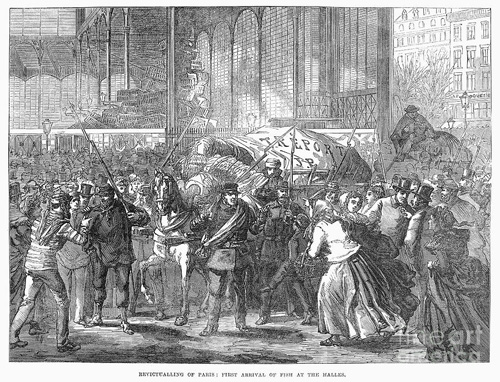A fictional account of the beginning of the siege of Paris from Emile Zola's novel La débâcle [ The Downfall ] (1892)
On the day succeeding the battle of Sedan the mighty hosts of the two German armies, without the delay of a moment, commenced their march on Paris . . . A few shells from the enemy  sufficed to do the work; the panic started with a regiment of zouaves made up of raw recruits, and quickly spreading to the other troops, all were swept away in a headlong rout that never ceased until they were safe behind the walls of Paris, where the utmost consternation prevailed. Every position in advance of the southern line of fortifications was lost, and that evening the wires of the Western Railway telegraph, the city's sole remaining means of communicating with the rest of France, were cut. Paris was cut off from the world.
sufficed to do the work; the panic started with a regiment of zouaves made up of raw recruits, and quickly spreading to the other troops, all were swept away in a headlong rout that never ceased until they were safe behind the walls of Paris, where the utmost consternation prevailed. Every position in advance of the southern line of fortifications was lost, and that evening the wires of the Western Railway telegraph, the city's sole remaining means of communicating with the rest of France, were cut. Paris was cut off from the world.
The condition of their affairs caused Maurice a terrible dejection. Had the Germans been more enterprising they might have pitched their tents that night in the Place du Carrousel, but with the prudence of their race they had determined that the siege should be conducted according to rule and precept, and had already fixed upon the exact lines of investment . . . The gigantic blockade, that no one believed could be successfully completed, was an accomplished fact; the city, with its girdle of fortifications eight leagues and a half in length, embracing fifteen forts and six detached redoubts, was henceforth to be transformed into a huge prison-pen. . . .
Paris was a great intrenched camp. The preparations for the defense went on from hour to hour with feverish haste; roads were built, houses demolished within the military zone; the two hundred siege guns and the twenty-five hundred pieces of lesser caliber were mounted in position, other guns were cast; an arsenal, complete in every detail, seemed to spring from the earth under the tireless efforts of Dorian, the patriotic war minister. When, after the rupture of the negotiations at Ferrieres, Jules Favre acquainted the country with M. von Bismarck's demands--the cession of Alsace, the garrison of Strasbourg to be surrendered, three milliards of indemnity--a cry of rage went up and the continuation of the war was demanded by acclaim as a condition indispensable to the country's existence. Even with no hope of victory Paris must defend herself in order that France might live.